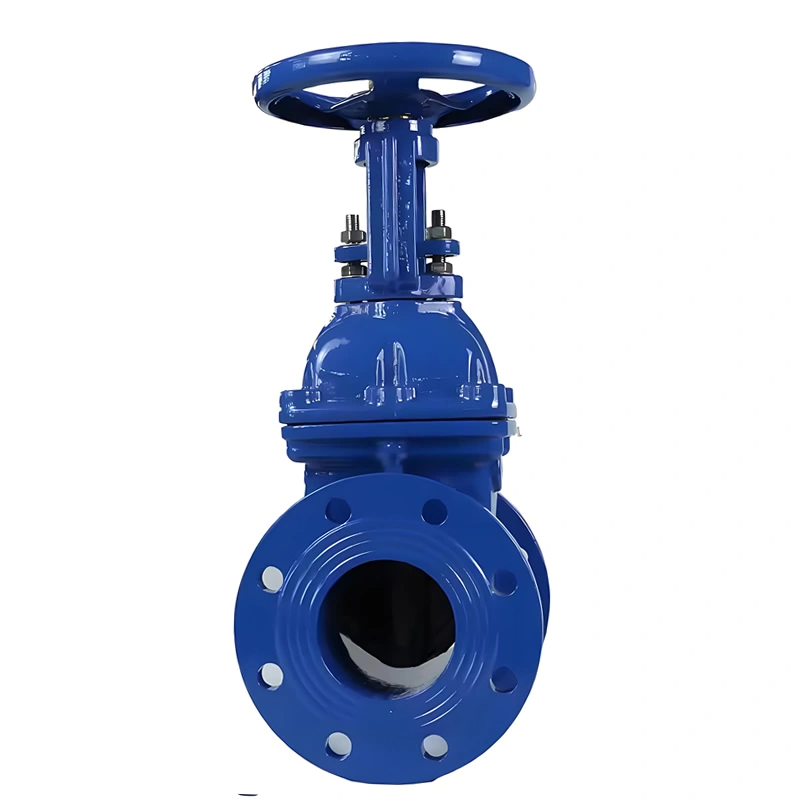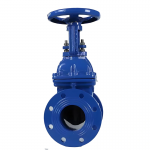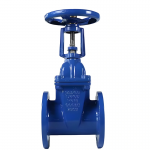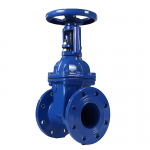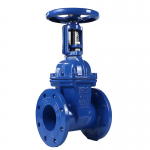Specification
DN50~DN1200 PN10~PN16 Cast Iron Rising Stem Solid Wedge Gate Valve
I. Product Overview
II. Key Attribute Parameters
- Size Range: DN50~DN1200, covering small to large-diameter pipelines for diverse applications, from water supply to industrial fluid transfer.
- Pressure Range: PN10~PN16 (1.0MPa~1.6MPa), adapting to low to medium-pressure systems such as municipal water networks and auxiliary steam lines.
- Temperature Range: -10℃~120℃, suitable for normal and moderately heated media like cold/hot water, low-pressure steam, and light oil.
- Material Configuration:
- Body & Bonnet: Cast iron/ductile iron, offering high strength and cost-effectiveness for general industrial use.
- Wedge: Cast iron/ductile iron (solid wedge), ensuring tight sealing by wedging against seats under pressure.
- Stem: Stainless steel (SS420) or brass, resistant to corrosion and ensuring smooth vertical movement (rising stem).
- Sealing Components: EPDM/NBR sealing rings and flexible graphite packing, providing reliable leak-tightness and compatibility with water, oil, and mild chemicals.
- Connection Type: Flanged, with drilling conforming to DIN 2533, ANSI 125/150, and JIS 10K standards for global pipeline integration.
- Actuation: Manual (handwheel), with rising stem design for clear visual indication of valve position.
- Design & Test Standards: Design follows DIN 3352 F4/F5, MSS SP-70; testing complies with DIN 3230 (hydrostatic and leakage tests) to ensure performance.
Size DN50-DN1200 Nominal Pressure PN10/PN16 WorkingTemperature -10°C~120°C Suitable Medium Chemicals,air,water,steam,oil, acids,salts,etc Design standard DIN3352 F4/F5, MSS SP-70,AWWA C509/515,BS5163 Face to Face DIN3202 F4/F5, BS5163, ANSI B16.10 Flange Drilling DIN2533 PN10/PN16, ANSI 125/150,JIS10K Test Inspection DIN3230, BS6755 Body Cast Iron, Ductile Iron Wedge Cast Iron, Ductile Iron Stem Stainless steel,Brass Sealing Ring EPDM,NBR O Ring EPDM,NBR
Product Overview
III. Features Description
- Rising Stem Design: The stem extends vertically as the valve opens, providing direct visual confirmation of opening status—critical for operators to verify if the valve is fully open/closed, reducing operational errors in water or chemical pipelines.
- Solid Wedge Structure: The one-piece solid wedge ensures uniform contact with seats, adapting to minor pipeline misalignment and maintaining tight sealing. This design is durable for frequent operation, avoiding leakage common in split wedge valves under low pressure.
- Cast Iron Durability: Ductile iron body resists mechanical impact and corrosion from water and light chemicals, withstanding long-term use in humid or industrial environments without deformation.
- EPDM Sealing: EPDM/NBR sealing rings offer excellent elasticity and chemical resistance, ensuring leak-tightness for water, oil, and mild acids. The material retains flexibility at -10℃~120℃, avoiding hardening or cracking.
- Global Standard Compatibility: Flange drilling and face-to-face dimensions comply with DIN, ANSI, and JIS, enabling seamless installation in European, North American, and Asian pipeline systems—avoiding adaptation issues in international projects.
IV. Manufacturing Processes
- Casting: Cast iron/ductile iron ingots are melted and poured into precision molds. The casting process ensures uniform material density, with ultrasonic testing to detect internal defects (e.g., pores, cracks) that could weaken structural strength.
- Machining: Body, bonnet, and wedge are CNC-machined to strict tolerances. Seat surfaces are ground to Ra ≤1.6μm for uniform contact with the wedge; stem threads are precision-cut to ensure smooth rising movement.
- Assembly: Components (body, bonnet, stem, wedge) are assembled with torque-controlled fasteners. Sealing rings and packing are installed to ensure leak-tightness, with special focus on stem packing to prevent external leakage.
- Testing:
- Hydrostatic Test: Body tested at 1.5×rated pressure (e.g., 2.4MPa for PN16) for 30 minutes to check for structural leaks.
- Sealing Test: Seat tested at 1.1×rated pressure with water to confirm no leakage, simulating real working conditions.
- Operation Test: 100+ open/close cycles verify smooth stem movement and wedge seating, ensuring consistent performance.
- Surface Treatment: The exterior is painted with anti-corrosion paint to resist rust, extending service life in outdoor or humid environments.
Valve Details
V. Product Advantages
- Visual Operation Safety: Rising stem design eliminates ambiguity in valve status, reducing the risk of accidents in critical systems (e.g., chemical transfer lines where unexpected closure could cause overpressure).
- Reliable Sealing: Solid wedge and EPDM seals ensure tight shut-off, with leakage rates below industry standards—critical for water conservation in municipal systems and preventing chemical waste.
- Cost-Effective Durability: Cast iron/ductile iron construction balances performance and cost, with a service life of 10~15 years—lowering long-term replacement costs compared to stainless steel valves in non-corrosive media.
- Easy Maintenance: Flanged connection allows in-line disassembly; replaceable sealing rings and packing simplify repairs, reducing downtime in water or industrial pipelines.
- Global Compatibility: Compliance with multiple standards enables use in international projects, from European municipal water networks to Asian industrial plants, avoiding design modifications.
Application
VI. Application Fields
- Municipal Water Supply: Controls water flow in distribution networks, with reliable sealing preventing leakage and rising stem design ensuring operators can verify valve status for stable water pressure.
- Industrial Heating Systems: Regulates low-pressure steam or hot water flow in factory heating loops, with EPDM seals resisting thermal aging and cast iron body withstanding moderate temperatures.
- Chemical Processing: Manages flow of mild chemicals (acids, salts) in non-corrosive circuits, leveraging ductile iron’s resistance to chemical attack and tight sealing to avoid contamination.
- Oil & Gas Auxiliary Lines: Controls light oil flow in storage or transfer systems, with solid wedge design ensuring shut-off reliability and rising stem providing operational clarity.
RELATED
-

High Temperature/Pressure 304 Stainless Steel Resistant Manual Power Forged Three Piece Flanged Floating Ball Valve
TIANYU 304 Stainless Steel Flanged Floating Ball Valve: Corrosion-Resistant Full-Port Flow Control Solution for Industrial, Sanitary, and Municipal Me…
BALL VALVE 11/03/2025 -

API ANSI 2in-16in DN50-DN400 PN10 PN16 CF8M Pneumatic Flanged Floating Ball Valve
TIANYU CF8M Pneumatic Flanged Floating Ball Valve: 2in-16in (DN50-DN400) PN10-PN16 API/ANSI Class Corrosion-Resistant Flow Control Solution for Indust…
BALL VALVE 11/01/2025 -

Large-Diameter DN1400 CLASS150 WCB SS Triple Eccentric Metal-Sealed Hard Seal Butterfly Valve
TIANYU DN1400 (56″) CLASS 150 WCB Hard Seal Butterfly Valve: Triple Eccentric Metal-Sealed Flanged Valve for Large-Diameter Industrial Media wit…
BUTTERFLY VALVE 10/30/2025 -

PN16 Stainless Steel Floating Ball Valve: Full Port 2PC Flange-Connected Valve with Fire-Safe & Anti-Static SS Ball Valve
TIANYU Stainless Steel Floating Ball Valve: Full Port 2PC Flange-Connected Valve with Fire-Safe & Anti-Static Design for Oil, Gas, and Industrial …
BALL VALVE 10/29/2025 -

High-Performance DN80 Class 150 WCB Soft-Sealed Lug-Type Double Eccentric Butterfly Valve
TIANYU 3” Class 150 WCB lug-type double eccentric butterfly valve is a technologically advanced flow control device engineered to address the challeng…
BUTTERFLY VALVE 10/25/2025 -

DN125 PN16 CF8M Stainless Steel Lug-Type Butterfly Valve with PTFE Lining Concentric Line Butterfly Valves
TIANYU DN125 PN16 CF8M stainless steel lug-type butterfly valve is a precision-engineered flow control device designed to address the challenges of ha…
BUTTERFLY VALVE 10/25/2025


